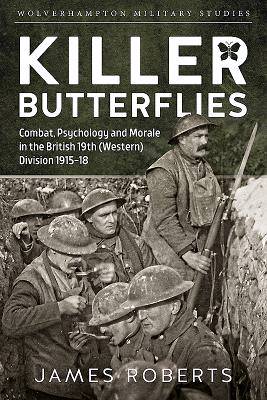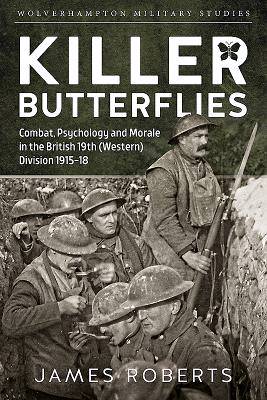
- Retrait gratuit dans votre magasin Club
- 7.000.000 titres dans notre catalogue
- Payer en toute sécurité
- Toujours un magasin près de chez vous
- Retrait gratuit dans votre magasin Club
- 7.000.0000 titres dans notre catalogue
- Payer en toute sécurité
- Toujours un magasin près de chez vous
Killer Butterflies
Combat, Psychology and Morale in the British 19th (Western) Division 1915-18
James Roberts
48,95 €
+ 97 points
Description
In this ground-breaking work, James Roberts examines the willingness and ability of British volunteer and conscript infantrymen of the Great War to perform the soldier's fundamental role: to kill or maim the enemy, and accept the attendant chance of being killed or wounded. The literature to date has been, paradoxically, somewhat silent on the soldier's part in the act of killing. This study recovers this neglected narrative through the experiences of 19th (Western) Division, as recorded in their unit war diaries - a source generated primarily to record the experiences of combat. The study's findings offer testimony to the courage and endurance of the Great War soldier in circumstances of terrible hardship and suffering. But they also reveal much lesser known and understood aspects of the soldier's behaviour in combat. Many infantrymen were unable and/or unwilling to traverse the experiential divide between civilian life and the ultimate act of soldiery. This in itself indicates the immense psychological steps taken by those (perhaps the minority) who found themselves capable of killing. Those who did fight gravitated towards weapons (such as the machine-gun or Mills Bomb) that, primarily through visual distance, partially sanitised the act of maiming the enemy. The bayonet kill, a far more personal form of combat, was a rare act; despite the British Army's undiminished championing of the bayonet as the principal weapon of the infantryman. But neither were the pacifistic legions always pawns in the hands of their senior commanders. Upon the physical No Man's Land they discovered a behavioural grey area between complete obedience and absolute defiance, and were able to tacitly limit their commitment to combat through subtle passive behaviour such as 'straggling' or "going to ground". In doing so they successfully wrestled back a degree of control over their battlefield fate. From a number of conclusions drawn by the study one predominates: civilian mores and values were not always surrendered the moment the infantryman crossed the parapet; many soldiers during the Great War found themselves willing servicemen, but reluctant killers.
Spécifications
Parties prenantes
- Auteur(s) :
- Editeur:
Contenu
- Nombre de pages :
- 284
- Langue:
- Anglais
- Collection :
Caractéristiques
- EAN:
- 9781911512240
- Date de parution :
- 17-08-17
- Format:
- Livre relié
- Format numérique:
- Genaaid
- Dimensions :
- 155 mm x 236 mm
- Poids :
- 589 g

Les avis
Nous publions uniquement les avis qui respectent les conditions requises. Consultez nos conditions pour les avis.






